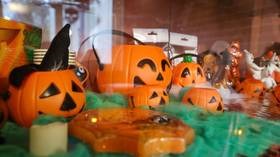Russian MPs propose renaming Halloween

The head of the social policy committee of the State Duma, Yaroslav Nilov, has suggested re-branding Halloween to better reflect Russian national traditions. He made the comments amid an ongoing controversy as to whether the holiday should be banned in the country.
“I propose to celebrate Halloween in Russia under the name of the Day of Spooky Fairy Tales and Stories,” Nilov, a senior MP representing the Liberal Democratic Party of Russia, told RT on Sunday. “This way, we will get away from being tied to Western culture and foreign names, but we will retain the fun that many people are used to.”
The politician noted that every October there is a debate in society as to whether Halloween celebrations should be banned “as an element of pro-Western propaganda” - many defend it as merely “popular amusement.” According to Nilov, both sides are right as the tradition has gained popularity in Russia over the years and at this point it will not be “possible to simply ban it.”
The lawmaker called for unconventional approaches, praising the Russian city of Pereslavl-Zalessky, where piles of pumpkins were put on display in celebration of the Russian Harvest Day.
“Now, that's the right creative approach to substitution,” Nilov said. Earlier, the Chairman of the Association of Manufacturers of Children's Goods, Works, and Services, Mikhail Vetrov, proposed replacing Halloween with a traditional harvest festival.
Celebrated on October 31, Halloween’s origins can be traced back to the ancient Celtic festival known as Samhain. It was believed that on that day, the souls of the dead returned to their homes, so people dressed in costumes and lit bonfires to ward off spirits. It has since evolved into a day of parties, costumes, scary movies, jack-o-lanterns and trick-or-treating for kids and adults.
The current name is a contraction of All Hallows' Eve, reflecting that it is the evening before All Saints' (or All Hallows') Day. Although the eighth century origins of the religious holiday are obscure, this seems to indicate a previous attempt to "clean up" the celebration.
While the holiday has never been banned in Russia, some regions have deemed it inappropriate, arguing that it contradicts the nation's heritage and traditions and there have been repeated calls for the restriction of the celebration, especially in schools and kindergartens.













